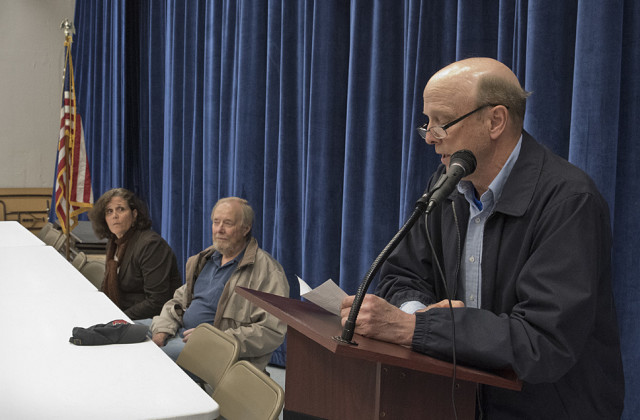State Threatens to Slash Norfolk’s Education Grant
Town obligated to make up difference
By Wiley Wood
This year’s Annual Budget Hearing, usually one of the highlights of the town calendar, lasted exactly two minutes and 11 seconds. Vice-Chairman Graham Allyn announced to a largely empty room that the Board of Finance had no budget it was prepared to discuss with the town.
The state, facing huge and growing deficits, is still debating what it will fund and what it will drop from its budget. “It has put out a number of scenarios,” according to Allyn, “the most damaging of which would cut Norfolk’s ECS grant by $381,000.”
The Education Cost Sharing grant is the state’s contribution to K–12 education, otherwise paid for by local governments. In recent years, the state has underwritten Norfolk’s education budget of $4.2 million to the tune of about $380,000.
In its budget for the coming year, the Appropriations Commission has proposed decreasing Norfolk’s ECS grant to $55,000. In an alternate budget proposed by the governor, Norfolk’s ECS grant would be reduced to zero.
But, said Allyn, although the state is withholding education funds from Norfolk this year, the town cannot reduce its education budget. “The more than $300,000 that the town has to make up will have to come from somewhere in the town’s general budget,” said Allyn.
A Connecticut statute known as the Minimum Budget Requirement prohibits municipalities from reducing their education budget from one year to the next.
Allyn invited residents to attend the Board of Finance’s next meeting on May 3 at 8 p.m. in Town Hall, when cuts will be discussed. He then formally postponed the annual hearing until the town had better information about the state’s spending.
The legislative session in Hartford ends on May 4, by which time the state is expected to have set its budget.
Earlier, at an April 12 meeting of the Board of Finance, First Selectman Sue Dyer presented the town’s general budget and asked for an increase of $60,000. Two new trucks are needed by the Public Works Department. “That’s if the town wants to get plowed out next winter,” said Dyer. Additional money was also needed to train an assistant assessor, to buy a cost-saving propane heater for the new town garage and to demolish two town structures, the trooper building and the annex by Town Hall.
The Board of Education presented a budget that also calls for a modest increase of $56,000. Superintendent Mary Beth Iacobelli explained that while the board was able to keep educational spending flat despite contractual increases in its teacher salaries, it was asking for additional money to cover the cost of maintenance to the school building.
In an interview, Iacobelli cited a project to replace old tiles and repaint hallways that was deferred last year. In addition, the building needs new heaters. “One of them blew up this winter, and it infuriated me to put money into a 25-year-old piece of equipment. But you have to do it,” said Iacobelli. She has also earmarked $15,000 for major work on the building’s electrical plan, as electronic devices play an ever-increasing role in the classroom.
“During the regionalization hearings, people talked about how Colebrook’s building had fallen into disrepair,” says Iacobelli. “If we are flat-funded year after year, soon we’ll be sitting in the same sorry place. The school building is a huge asset and we need to maintain it.”
School enrollment, while it has stayed higher than a town-hired demographer projected, will dip by eight to 10 students next year, as an unusually large sixth grade graduates. Costs will not drop as a consequence, says Iacobelli, pointing out that an additional 50 students would hardly cost the school more than the 100 or so it educates now: “We would still need a teacher per grade, and that’s our major cost.”
The only part of the budget to decrease from last year is Norfolk’s bill for Northwestern Regional Seven. While overall spending is projected to increase 1.47 percent, Norfolk’s share will decrease by $97,000 due to a decline in its participation, from 96 to 92 students.
Molly Sexton Read, chairman of Regional Seven’s Board of Education, is quick to point out that for schools in the Berkshire League, “Regional is on the low end for cost and on the high end for achievement.” Its middle school is one of two finalists for best middle school in Connecticut.
“There’s no question that we’re in deep sneakers,” said Board of Finance Chairman Michael Sconyers at the April 12 meeting, as he tried to reconcile the town’s needs with the funding cuts by the state. “Are we going to call for another 10 percent increase in taxes? We just did that two years ago.”

